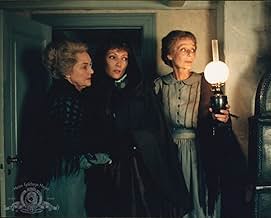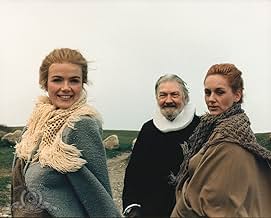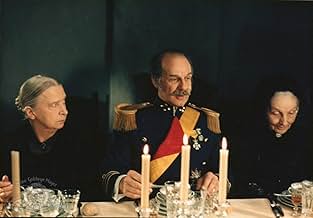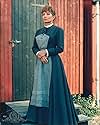NOTE IMDb
7,8/10
23 k
MA NOTE
À la fin du XIXe siècle, une communauté religieuse stricte dans un village danois accueille un réfugié français de la guerre franco-prussienne au service des filles du défunt pasteur.À la fin du XIXe siècle, une communauté religieuse stricte dans un village danois accueille un réfugié français de la guerre franco-prussienne au service des filles du défunt pasteur.À la fin du XIXe siècle, une communauté religieuse stricte dans un village danois accueille un réfugié français de la guerre franco-prussienne au service des filles du défunt pasteur.
- Réalisation
- Scénario
- Casting principal
- Récompensé par 1 Oscar
- 11 victoires et 8 nominations au total
Stéphane Audran
- Babette Hersant
- (as Stephane Audran)
Jean-Philippe Lafont
- Achille Papin
- (as Jean Philippe Lafont)
Ghita Nørby
- Narrator
- (voix)
Asta Esper Hagen Andersen
- Anna
- (as Asta Esper Andersen)
Avis à la une
It has started quietly. If your are looking for an action-packed movie this is absolutely not the right choice. All characters are slowly depicted on the scene. Stroke after stroke on the scene canvas. None can take away his hands to the priest and so the sisters lifespan devotion can only remain into the village. Philippa and Martina know their destiny, belong only to the village. So when you understand that, you are on the movie scene, in the village that becomes the whole known world in that time. When, no technology can let you imagine anything else than the campaign, the village, the sea. You feel the rhythm of that ancient village's life. Watching the movie in a cold snowy late afternoon can cause you to approach this evening dinner with some sumptuous expectations ...
The final sentence that give a title to Babette's sacrifice far from Paris: An artist is never poor.
Superb photography. Many situations depict portraits and landscapes as they were styled on canvas there, in Jutland, in 18th century.
The final sentence that give a title to Babette's sacrifice far from Paris: An artist is never poor.
Superb photography. Many situations depict portraits and landscapes as they were styled on canvas there, in Jutland, in 18th century.
The 1987 Oscar winner for Best Foreign Film is an austere but ultimately joyous fable set on a desolate spit of coastline in northern Denmark, where for sustenance the puritan townsfolk rely first on prayer and afterwards on their daily ration of a thin, brown gruel made from soggy bread crusts and dehydrated flounder. But all that changes with the arrival from Paris of an attractive refugee (the story takes place during the French Revolution) who thanks her benefactors, and tests their strict religious principles, by preparing a sinfully delicious gourmet feast for the entire town. The meal is more than enough to tempt even the most devout ascetic, but of course the dour villagers do their best to look as if they're not enjoying each luxurious mouthful. It's rare these days to find a film so unafraid of simple virtues, without even a trace of malice or cynicism to spoil its bittersweet charm. In the end the gap dividing the villagers' spiritual and earthly appetites is happily bridged, proving again that few things (except perhaps a good movie) are as life embracing as a hearty meal.
Stephane Audran is the eponymous heroine of this beautifully measured study of a small Danish community towards the end of the last century. Two beautiful and musically talented sisters give-up their own prospects of happiness and marriage in order to look-after their ageing father. One day, a French woman, Babette, comes to work for them. After some years she wins the lottery and is determined to do something for the sisters who have taken her in. Her solution is to prepare an exquisite and sumptuous feast, which changes the lives of all those invited. This is a film about human and cultural interaction, reflected in the changing language of the dialogue from Danish to French, and especially between the dutiful sobriety of Protestant northern Europe and the sensuousness of the Catholic south. It is also about human needs, and how warmth and kindness can be expressed and stimulated through the cultivation of the senses. A profoundly uplifting film.
This movie came aside as a shock in the eighties.Far from trends,that is to say in the heart of sincere creativity,Babettes gaestebud stands as one of the finest movies of its time.Stephane Audran,the wonderful actress of her ex-husband Claude Chabrol's greatest achievements (le boucher,la rupture,les noces rouges,all unqualified musts for movie buffs)gave a lifetime performance.To see her prepare with love and affection her meal is a feast for the eyes.All the people who saw this masterpiece actually tasted,ate Babette's culinary triumph. But the most moving part of the story is its conclusion:Babette was a great French chef,she was famous,now she found a new homeland but her heyday is behind her and she won't never be allowed to come back to her dear France.So the two old sisters do comfort her:In heaven,there will be huge kitchens where she'll cook for eternity.While sharing her fortune with her new friends,Babette changed their life,she gave them pleasure and a magic evening they would remember forever.In this simple but extraordinary screenplay,human warmth is everywhere,and I wish everybody a Babette's feast,would it be only for one starry night...
If you find the first 30 minutes of this film to be so slow that you wonder why you're watching it, don't give up. Also, hearing the Danish language is a bit new to most North Americans, who don't see and hear a lot of Danish films. Anyway, as the film progressed it got better and better and the viewer is rewarded for his/her patience.
Being a fan of the movie, "Out Of Africa," this film piqued my interest because it's based on a short novel by Isak Dinesen (Karen Blixen), the major character in that film.
The meal - Babette's feast - was amazing. I'm no chef, but I was impressed! How one interprets the story, too, varies, I suppose depending on how much you read into this, and where you stand religion-wise. If the latter, how you look at the definition of "legalism" can affect how you interpret this story.
In any case, it's a fine film, but don't watch this if you're dieting.
Being a fan of the movie, "Out Of Africa," this film piqued my interest because it's based on a short novel by Isak Dinesen (Karen Blixen), the major character in that film.
The meal - Babette's feast - was amazing. I'm no chef, but I was impressed! How one interprets the story, too, varies, I suppose depending on how much you read into this, and where you stand religion-wise. If the latter, how you look at the definition of "legalism" can affect how you interpret this story.
In any case, it's a fine film, but don't watch this if you're dieting.
Le saviez-vous
- AnecdotesFirst Danish movie to win an Academy Award for best foreign language film.
- GaffesIn 1871 Babette pays with skilling, which was the currency used at that time; 14 years later, Babette still uses skilling, but Denmark changed the currency in 1875 from skilling to kroner and orer.
- ConnexionsEdited into Eventyret om dansk film 18: Nye perspektiver - 1970-1987 (1996)
- Bandes originalesWaltz No. 15 in A-flat major Op. 39
(arranged for orchestra) (uncredited)
Written by Johannes Brahms
Played during the dance hosted by the Royal family
Meilleurs choix
Connectez-vous pour évaluer et suivre la liste de favoris afin de recevoir des recommandations personnalisées
Détails
- Date de sortie
- Pays d’origine
- Langues
- Aussi connu sous le nom de
- El festín de Babette
- Lieux de tournage
- Sociétés de production
- Voir plus de crédits d'entreprise sur IMDbPro
Box-office
- Montant brut aux États-Unis et au Canada
- 4 398 938 $US
- Montant brut mondial
- 4 637 920 $US
- Durée1 heure 43 minutes
- Mixage
- Rapport de forme
- 1.66 : 1
Contribuer à cette page
Suggérer une modification ou ajouter du contenu manquant

Lacune principale
By what name was Le festin de Babette (1987) officially released in India in English?
Répondre






























